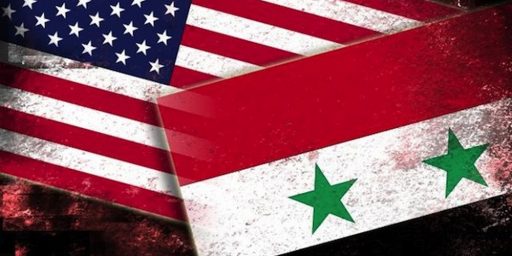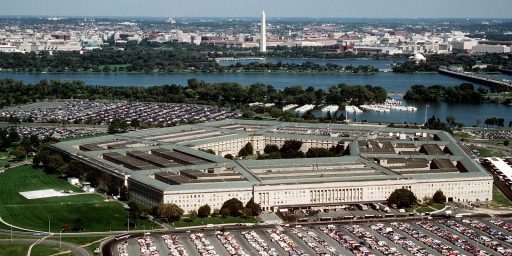WMD DEAL?
MSNBC’s Michael Moran poses an interesting question: Could Saddam avoid the hangman by revealing WMD?
With Saddam Hussein now residing in a cell on the grounds of the international airport that once bore his name, and with the prospect of him being tried by the very people he misruled, tortured and murdered for decades, there doesn̢۪t appear to be a whole lot of incentive for a vanquished despot to start singing. But what if the Bush administration, so desperately eager to clear up the impression that it drove the nation into a war under false pretenses, offered Saddam a deal: Show us where you buried the WMD, and the death penalty is off the table?
American officials, in keeping with senior Bush administration policy at the moment, are being careful not to predict any kind of intelligence bonanza about the Iraqi resistance beyond what already flowed from briefcase of documents captured along with the vanquished despot on Saturday.
After a longish discussion about the ethics of such a deal, the political ramifications and, indeed, whether there are any WMD to reveal at this point, Moran thinks such a deal unlikely. Still, he grants that it would be a huge coup:
Should Saddam Hussein lead American search teams to a WMD smoking gun, even a small one, election 2004 is over before it’s over, no matter what Yogi Berra says. And Santa could fly right by Crawford, Texas. After all, what other gift could possibly compete?
The piece also has an interesting Fact File as an inset entitled, “What Bush said and when he said it.”
The failure of U.S. inspection teams to find evidence of the vast arsenal of chemical, biological and nuclear weapons that Washington accused Iraq of hiding before the war has become a major political problem for President Bush. Here is a selection of the president̢۪s quotes on the topic before and after the war.
Jan 31, 2002: State of the Union address
In the president’s first major expansion of the war on terrorism to include more traditional U.S. rivals, he described an “axis of evil” that included Iran, North Korea and Iraq. Of Baghdad he said: “Iraq continues to flaunt its hostility toward America and to support terror. The Iraqi regime has plotted to develop anthrax and nerve gas and nuclear weapons for over a decade. This is a regime that has already used poison gas to murder thousands of its own citizens — leaving the bodies of mothers huddled over their dead children. This is a regime that agreed to international inspections — then kicked out the inspectors. This is a regime that has something to hide from the civilized world.”Sept. 12, 2002: Address to the U.N. General Assembly
President Bush steered clear of direct accusations for most of the summer of 2002, allowing such statements to be leaked to the media or to come from his Cabinet. On Sept. 12, 2002, however, the president took the U.S. case directly to the U.N. General Assembly. In that address, he said:
“Delegates to the General Assembly, we have been more than patient. We’ve tried sanctions. We’ve tried the carrot of oil for food and the stick of coalition military strikes. But Saddam Hussein has defied all these efforts and continues to develop weapons of mass destruction. The first time we may be completely certain he has a — nuclear weapons is when, God forbids, he uses one. We owe it to all our citizens to do everything in our power to prevent that day from coming.”Oct. 7, 2002: Cincinnati speech on Iraq
The administration followed the president’s speech at the United Nations with a whirlwind campaign to win support for a U.N. resolution authorizing force. At the same time, Bush delivered what the White House billed as a “major foreign policy speech on Iraq” to the Cincinnati Museum Center:
“Some ask how urgent this danger is to America and the world. The danger is already significant, and it only grows worse with time. If we know Saddam Hussein has dangerous weapons today — and we do — does it make any sense for the world to wait to confront him as he grows even stronger and develops even more dangerous weapons?”Oct. 16, 2002 — Signing the Iraq war resolution
In October 2002, the House and Senate agreed after a short debate to authorize the use of force against Iraq if President Bush deemed such an action necessary. In the Oval Office signing ceremony, the president said:
“On the commands of a dictator, the regime is armed with biological and chemical weapons, possesses ballistic missiles, promotes international terror and seeks nuclear weapons.”Jan 31, 2003: State of the Union address
By January 2003, war with Iraq appeared imminent. President Bush’s case against Iraq became more specific, citing U.N., U.S. and foreign intelligence sources:
“Our intelligence officials estimate that Saddam Hussein had the materials to produce as much as 500 tons of sarin, mustard and VX nerve agent. In such quantities, these chemical agents could also kill untold thousands. He’s not accounted for these materials. He has given no evidence that he has destroyed them. U.S. intelligence indicates that Saddam Hussein had upwards of 30,000 munitions capable of delivering chemical agents. Inspectors recently turned up 16 of them — despite Iraq’s recent declaration denying their existence. Saddam Hussein has not accounted for the remaining 29,984 of these prohibited munitions. He’s given no evidence that he has destroyed them.”April 24, 2003: Abrams tank factory
Speaking at a factory in Lima, Ohio, that builds the Abrams main battle tank, Bush began to temper U.S. expectations by raising the possibility that Iraq had destroyed its weapons of mass destruction on the eve of the war:
“He tried to fool the United Nations and did for 12 years by hiding these weapons. And so it’s going to take time to find them,” the president said. “But we know he had them. And whether he destroyed them, moved them or hid them, we’re going to find out the truth”May 1, 2003: End to ‘major combat operations’
In a highly choreographed appearance on the carrier USS Abraham Lincoln, President Bush declared an end to “major combat operations” in Iraq. Weapons of mass destruction were not central to the speech. Rather, the president emphasized that the Iraq war was a seamless part of the war on terrorism that began on Sept. 11, 2001:
“Our war against terror is proceeding according to principles that I have made clear to all: Any person involved in committing or planning terrorist attacks against the American people becomes an enemy of this country and a target of American justice. Any person, organization or government that supports, protects, or harbors terrorists is complicit in the murder of the innocent and equally guilty of terrorist crimes. Any outlaw regime that has ties to terrorist groups and seeks or possesses weapons of mass destruction is a grave danger to the civilized world — and will be confronted.”June 5, 2003: With the troops in Qatar
“We recently found two mobile biological weapons facilities which were capable of producing biological agents. This is the man who spent decades hiding tools of mass murder. He knew the inspectors were looking for them. You know better than me he’s got a big country in which to hide them. We’re on the look. We’ll reveal the truth,” the president said.June 17, 2003: ‘Revisionist history’
As House and Senate intelligence panels considered inquiries into alleged “intelligence rigging” before the war, President Bush continued to defend the administration’s statements and actions:
“We acted in Iraq, as well. We made it clear to the dictator of Iraq that he must disarm,†he told an audience in Annandale, Va. “We asked other nations to join us in seeing to it that he would disarm, and he chose not to do so, so we disarmed him. And I know there’s a lot of revisionist history now going on, but one thing is certain. He is no longer a threat to the free world, and the people of Iraq are free.”Dec. 17, 2003: ‘What’s the difference?’
Three days after the capture of Saddam Hussein, President George W. Bush offered his most direct defense yet of the administration̢۪s decision to go to war. Speaking to ABC News̢۪ Diane Sawyer, Bush insisted the hunt for WMD would go on and said he had not ruled out finding weapons yet. When pressed by Sawyer, he insisted that finding WMD is not necessary to justify the war.
“So what’s the difference? If he were to acquire weapons, he would be the danger. That’s what I’m trying to explain to you. A gathering threat, after 9/11, is a threat that needed to be dealt with, and it was done after 12 long years of the world saying the man’s a danger.”
After most of the quotations is a link to “Details”–usually the speech in its entirety.




